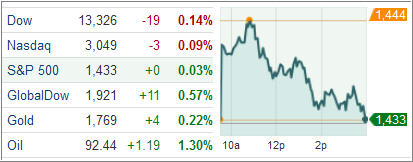US markets erased gains to end nearly flat today as early optimism over upbeat economic data faded and a slump in Apple Inc weighed on technology stocks.
Earlier, stocks rose for the first time this week and commodities rallied as risk sentiment improved following a record decline in US unemployment claims. A Labor Department report showed applications for jobless benefits declining by 30,000 last week to 339,000, the lowest since February 2008, what was later touted as an anomaly as one state may not have posted their numbers.
US trade deficit widened to $44.2 billion in August as weak demand slowed American exports to their lowest level since February, a Commerce Department report showed.
A separate report revealed import prices rose faster than expected at 1.1 percent in September while export prices rose 0.8 percent during the same period.
Extending losses into the fourth straight session, the Dow Jones Industrial Average (DJIA) lost 19 points, giving up more than 100 points from the day’s high of 13,428. Breadth within the 30-stock blue-chip index turned negative with laggards outpacing winners 18 to 12.
Snapping a four-day losing streak, the S&P 500 Index (SPX) finished fractionally higher, just managing to close above the breakeven line, with energy fronting the gainers and telecommunications faring the worst among its 10 business group.
The yield on the benchmark 10-year Treasury notes fell one basis point to 1.67 percent while 30-year Treasury bond yields dropped three basis points to 2.85 percent.
Meanwhile, the greenback retreated against major global currencies Thursday after a higher-than-expected drop in jobless claims boosted risk appetite. The euro bounced back with the EUR/USD pair trading at 1.2927 compared with 1.2869 recorded on late Wednesday as markets believed yesterday’s downgrade of Spain by ratings agency S&P may force the ambivalent Iberian nation to request a bailout at the next EU summit on October 18-19.
A sharper than expected drop in US unemployment-benefit claims boosted stocks across the Atlantic with the Stoxx Europe 600 index rising 0.8 percent, reversing a three-day losing streak.
The Spanish IBEX 35 index rose 0.9 percent in Madrid on the positive US jobs data despite getting downgraded to one notch above junk yesterday. Shares of Banco popular Espanol was the biggest percentage decliner, crashing 4.9 percent despite a Bloomberg report claiming the European Union may push back tougher bank capital rules for as long as a year.
In Italy, the government successfully auctioned debt worth EUR 6 billion across all maturities as demand for peripheral bonds picked up. The yield on 10-year Italian government bonds dropped eight basis points to 5.01 percent.
The DAX 30 index gained 1.1 percent in Frankfurt after index component Deutsche Bank added 3.6 percent. Siemens AG tanked 1.3 percent after Deutsche Bank cut its rating to hold from buy. The industrial group has already announced workforce reduction and a major overhaul of its business portfolios.
Helped by banks, Societe Generale and Credit Agricole, the CAC 40 index finished 1.4 percent higher in Paris.
In the UK, the FTSE 100 index rose 0.9 percent, lifted by banking major HSBC Plc and mining giant Rio Tinto. BAE Systems Plc tracked 2.4 percent higher after a $45-billion merger talk with rival EADS NV collapsed on Wednesday.
In the ETF space, energy linked funds advanced over rising tension between Syria and Turkey in the Middle East. However, the United States Oil Fund (USO) rallied 1.33 percent as crude prices rose over supply concerns.
The United States Natural Gas Fund (UNG) was one of the biggest percentage gainers, vaulting 4.61 percent after the latest EIA report showed a lower-than-expected rise in inventories, easing up oversupply fears.
For all updated momentum numbers, along with our Trend Tracking Index (TTI) positions, please see the latest StatSheet, which I will post shortly.
Disclosure: No holdings
Contact Ulli

